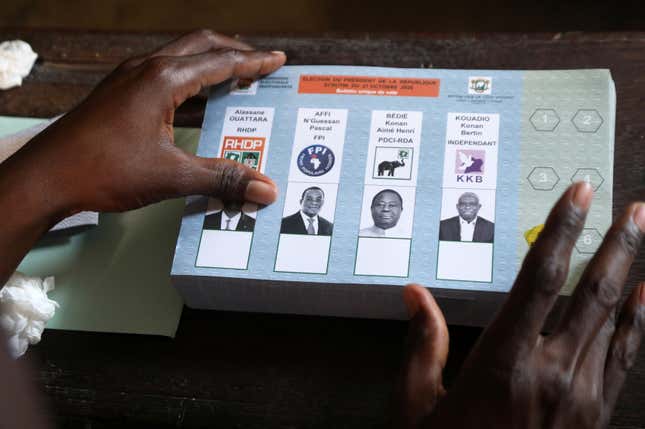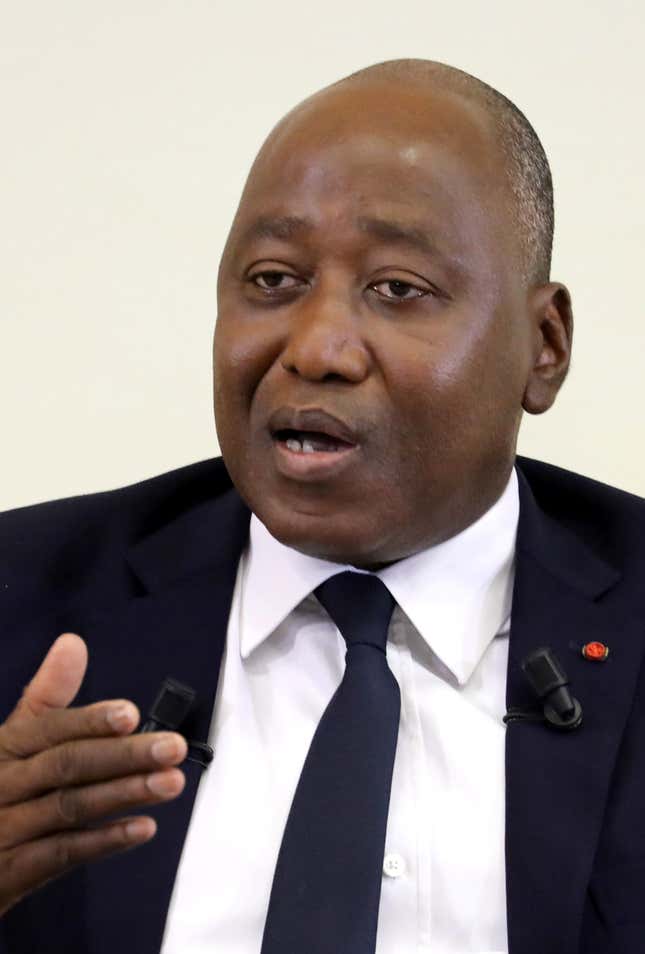Some 7.5 million people were expected to cast their ballots when polls opened on Saturday morning (Oct. 31) in Côte d’Ivoire as part of a presidential election which has already been marred with controversy and an opposition call for a complete boycott.
Incumbent president Alassane Ouattara, 78, who is seeking a third term in office, has called for an end to civil disobedience, after reports of disturbances in some opposition strongholds started to emerge over the weekend.
Electoral material was reportedly destroyed near Bouake, the country’s second largest city, while protesters put up barricades in several towns north of the economic capital, Abidjan.
But the Independent Electoral Commission (CEI) reassured voters that issues were reported in fewer than 50 polling stations out of the more than 23,000 across the country.
Polling stations were due to open at 8 am and close at 6 pm local time. But some delays were recorded across Abidjan, where the electoral commission staff ensured that the 10-hour legal voting period was respected.
The electoral commission announced an early tally of 68% voter turnout.
Around the normally bustling communes of Yopougon and Koumassi, the neighborhoods, schools, and markets were quiet. In the more residential area of Cocody, voters lined up at the various school sites turned polling stations for the day.
Showing appeared mixed across the city, where many chose to remain home amid sporadic episodes of violence, which have left at least 20 people dead since August.

In the popular Treichville commune, more voters made it to the polls by midday. “I left home at 6 am. I wanted to vote first thing in the morning,” said Kadhy Goika after putting her envelope in the ballot. “We have to overcome this. For peace. The people calling for boycott, they don’t care for our country. They are out of line and dangerous,” added the middle-aged woman.
Third terms
President Ouattara was first elected in 2010 and reelected 2015 election for what was presumed his second and final term. According to the RHDP

ruling party, since the Ivorian constitution stipulates that a president can only serve two consecutive terms in office, a revision of the constitution which was passed in 2016 set the counter back to zero.
In March, the Ouattara announced he wouldn’t be running again, but he also reiterated he had every right to do so.
Côte d’Ivoire’s political situation took a dark turn and began unraveling on July 8, when prime minister Amadou Gon Coulibaly, whom Ouattara had groomed as his successor, passed away.
Following Coulibaly’s death, Ouattara said he had no choice but to run for president again and the opposition immediately contested his decision. But on Sept. 15, the country’s Constitutional Court validated Ouattara’s candidacy, making the Côte d’Ivoire the most recent African country to have incumbents extend their rule by changing the constitution. Others include Rwanda and West African neighbor, Guinea. Recent tensions in Côte d’Ivoire have raised serious concern for Ivorians. It’s just 10 years after violence erupted following the refusal of then president Laurent Gbagbo to recognize his defeat against Ouattara, the specter of a troubled past weighs on people’s minds. The 2010 post electoral crisis left at least 3,000 dead.
Opposition leaders have called for a boycott of what they claim is already a flawed electoral process, including Ouattara’s closest rival Henri Konan Bédié, 86, who served as president between 1993 and 1999. Pascal Affi N’Guessan, 67, who served as prime minister between 2000 and 2003 under president Laurent Gbagbo has also called for a boycott of the election. The one opponent who hasn’t called for a boycott yet is Kouadio Konan Bertin, 51, is an MP. He is running as independent candidate.
Sign up to the Quartz Africa Weekly Brief here for news and analysis on African business, tech, and innovation in your inbox
